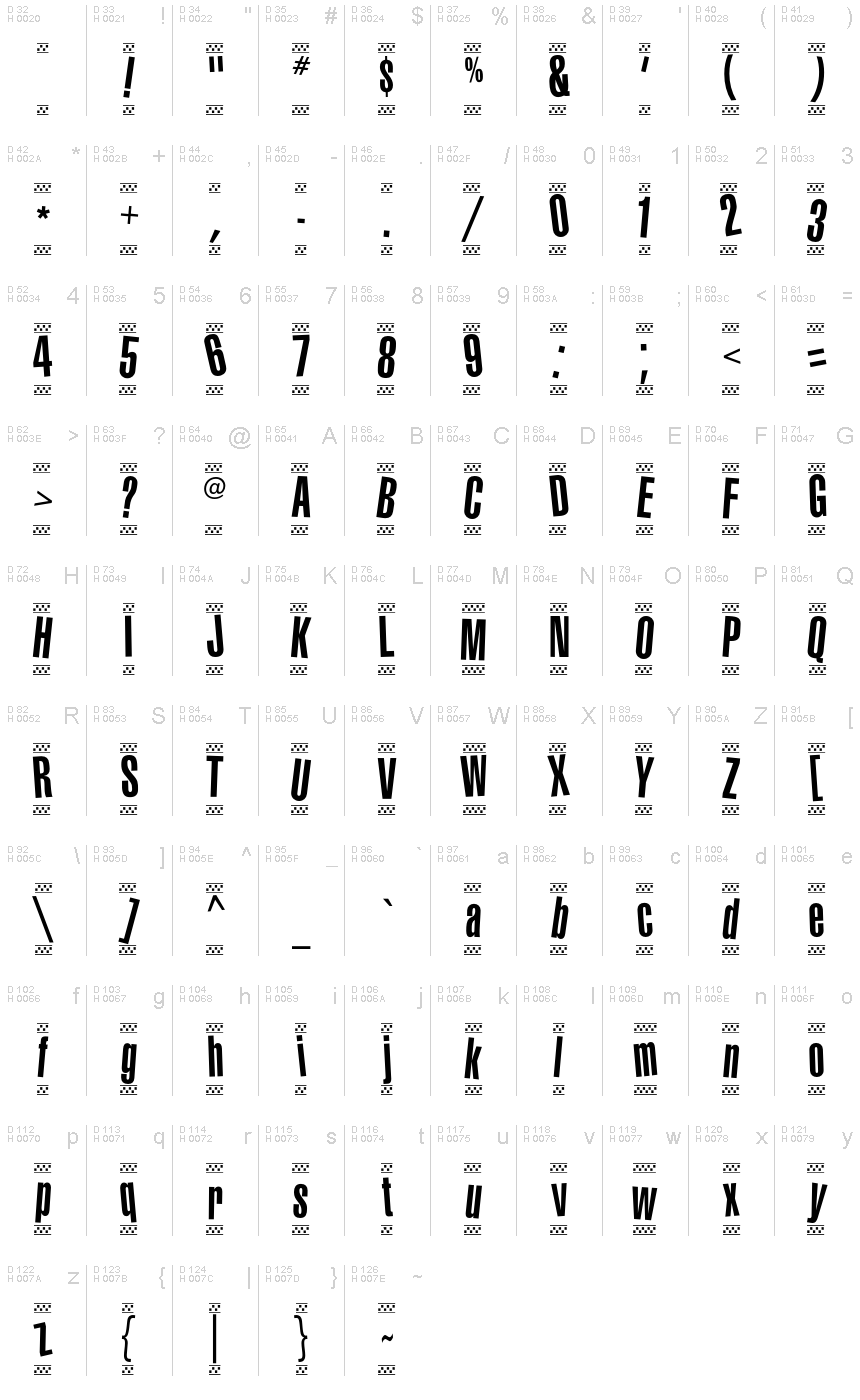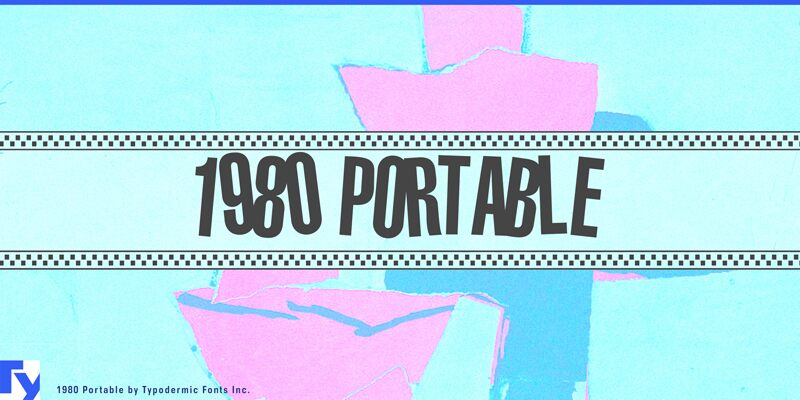NineteenEightyPortable-Regular
OpenTypeGNU/GPL
- Accenti (parziale)
- Accenti (completo)
- Euro
1980 Portable.otf
Tag
Nota dell'autore
The 1980 Portable font, created by Typodermic Fonts, exudes a playful, retro charm that immediately captivates the eye. With its bouncy, condensed letterforms and distinctive ska-inspired aesthetic, this display typeface evokes a sense of nostalgia and energy. The font's decorative style and attention to detail make it a standout choice for designers seeking to infuse their projects with a touch of vintage flair.
The 1980 Portable font's versatility shines through, making it a versatile choice for a variety of design applications. Its compact width and distinctive character lend themselves well to headlines, logos, and branding materials, where its visual impact can truly shine. Whether you're crafting a retro-themed poster, designing a vibrant album cover, or seeking to add a touch of personality to your packaging, the 1980 Portable font is a compelling option that is sure to capture the attention of your audience.
Most Latin-based European writing systems are supported, including the following languages. Afaan Oromo, Afar, Afrikaans, Albanian, Alsatian, Aromanian, Aymara, Bashkir (Latin), Basque, Belarusian (Latin), Bemba, Bikol, Bosnian, Breton, Cape Verdean, Creole, Catalan, Cebuano, Chamorro, Chavacano, Chichewa, Crimean Tatar (Latin), Croatian, Czech, Danish, Dawan, Dholuo, Dutch, English, Estonian, Faroese, Fijian, Filipino, Finnish, French, Frisian, Friulian, Gagauz (Latin), Galician, Ganda, Genoese, German, Greenlandic, Guadeloupean Creole, Haitian Creole, Hawaiian, Hiligaynon, Hungarian, Icelandic, Ilocano, Indonesian, Irish, Italian, Jamaican, Kaqchikel, Karakalpak (Latin), Kashubian, Kikongo, Kinyarwanda, Kirundi, Kurdish (Latin), Latvian, Lithuanian, Lombard, Low Saxon, Luxembourgish, Maasai, Makhuwa, Malay, Maltese, Māori, Moldovan, Montenegrin, Ndebele, Neapolitan, Norwegian, Novial, Occitan, Ossetian (Latin), Papiamento, Piedmontese, Polish, Portuguese, Quechua, Rarotongan, Romanian, Romansh, Sami, Sango, Saramaccan, Sardinian, Scottish Gaelic, Serbian (Latin), Shona, Sicilian, Silesian, Slovak, Slovenian, Somali, Sorbian, Sotho, Spanish, Swahili, Swazi, Swedish, Tagalog, Tahitian, Tetum, Tongan, Tshiluba, Tsonga, Tswana, Tumbuka, Turkish, Turkmen (Latin), Tuvaluan, Uzbek (Latin), Venetian, Vepsian, Vro, Walloon, Waray-Waray, Wayuu, Welsh, Wolof, Xhosa, Yapese, Zapotec Zulu and Zuni.
The font included in this archive is released under a no rights reserved Creative Commons Zero license. Please do not ask permission to do anything with this font. Whatever you want to do with this font, the answer will be yes. Please read about the CC0 Public Domain license before contacting me.
https://creativecommons.org/publicdomain/zero/1.0/
To the extent possible under law, Raymond Larabie has waived all copyright and related or neighboring rights to the font in this archive. This work is published from: Japan.
The 1980 Portable font's versatility shines through, making it a versatile choice for a variety of design applications. Its compact width and distinctive character lend themselves well to headlines, logos, and branding materials, where its visual impact can truly shine. Whether you're crafting a retro-themed poster, designing a vibrant album cover, or seeking to add a touch of personality to your packaging, the 1980 Portable font is a compelling option that is sure to capture the attention of your audience.
Most Latin-based European writing systems are supported, including the following languages. Afaan Oromo, Afar, Afrikaans, Albanian, Alsatian, Aromanian, Aymara, Bashkir (Latin), Basque, Belarusian (Latin), Bemba, Bikol, Bosnian, Breton, Cape Verdean, Creole, Catalan, Cebuano, Chamorro, Chavacano, Chichewa, Crimean Tatar (Latin), Croatian, Czech, Danish, Dawan, Dholuo, Dutch, English, Estonian, Faroese, Fijian, Filipino, Finnish, French, Frisian, Friulian, Gagauz (Latin), Galician, Ganda, Genoese, German, Greenlandic, Guadeloupean Creole, Haitian Creole, Hawaiian, Hiligaynon, Hungarian, Icelandic, Ilocano, Indonesian, Irish, Italian, Jamaican, Kaqchikel, Karakalpak (Latin), Kashubian, Kikongo, Kinyarwanda, Kirundi, Kurdish (Latin), Latvian, Lithuanian, Lombard, Low Saxon, Luxembourgish, Maasai, Makhuwa, Malay, Maltese, Māori, Moldovan, Montenegrin, Ndebele, Neapolitan, Norwegian, Novial, Occitan, Ossetian (Latin), Papiamento, Piedmontese, Polish, Portuguese, Quechua, Rarotongan, Romanian, Romansh, Sami, Sango, Saramaccan, Sardinian, Scottish Gaelic, Serbian (Latin), Shona, Sicilian, Silesian, Slovak, Slovenian, Somali, Sorbian, Sotho, Spanish, Swahili, Swazi, Swedish, Tagalog, Tahitian, Tetum, Tongan, Tshiluba, Tsonga, Tswana, Tumbuka, Turkish, Turkmen (Latin), Tuvaluan, Uzbek (Latin), Venetian, Vepsian, Vro, Walloon, Waray-Waray, Wayuu, Welsh, Wolof, Xhosa, Yapese, Zapotec Zulu and Zuni.
The font included in this archive is released under a no rights reserved Creative Commons Zero license. Please do not ask permission to do anything with this font. Whatever you want to do with this font, the answer will be yes. Please read about the CC0 Public Domain license before contacting me.
https://creativecommons.org/publicdomain/zero/1.0/
To the extent possible under law, Raymond Larabie has waived all copyright and related or neighboring rights to the font in this archive. This work is published from: Japan.
Mappa caratteri
Si prega di utilizzare il menu a tendina per visualizzare le mappe di caratteri diversi contenuti in questo tipo di font.

Informazioni di base caratteri
Dichiarazione di Copyright
Released in 2024 under CC0 license. No rights reserved.
Font famiglia
Nineteen Eighty Portable
Font sottofamiglia
Regular
Sottofamiglia unico di identificazione
Version 4.003;TYPO;NineteenEightyPortable-Regular;1969;FL830
Nome completo del font
NineteenEightyPortable-Regular
Nome tabella versione
Version 4.003
Postscript nome del font
NineteenEightyPortable-Regular
Fabbricante
Raymond Larabie
Progettista
Informazioni estese caratteri
Piattaforme supportate
PiattaformaCodifica
UnicodeUnicode 2.0 e poi semantica, unicode BMP solo
MacintoshRomano
MicrosoftUnicode BMP solo
Dettagli carattere
Revisione4
Contatore glifi317
Unità per em1000
Incorporare i dirittiIncorporamento per anteprima di stmapa consentito
Classe famigliaNessuna classificazione
PesoMedio leggero
AltezzaExtra condensato
Mac styleGrassetto
DirezioneSolo fortemente sinistra a destra glifi + contiene neutrali
Disegno naturaRegolari
